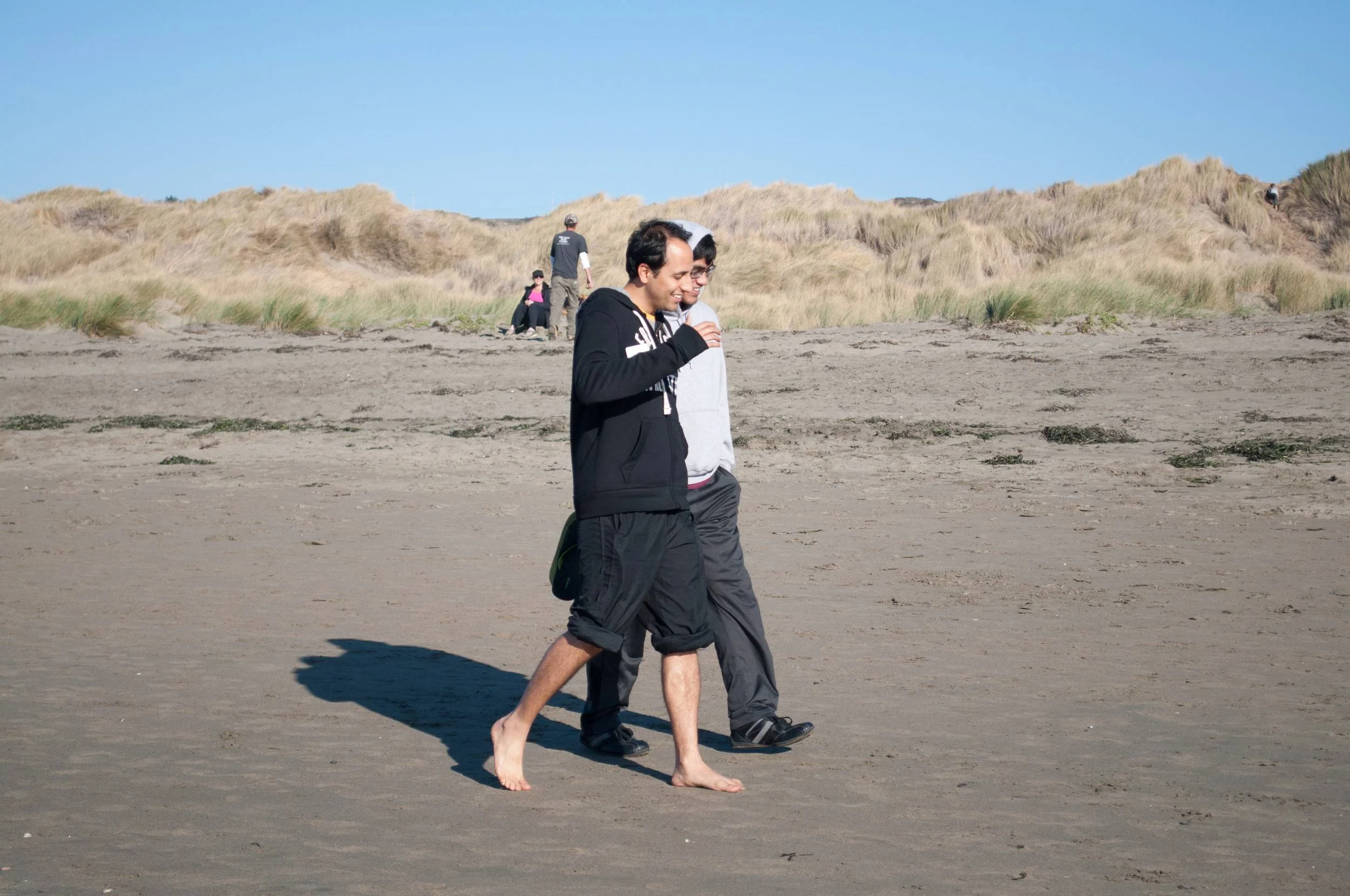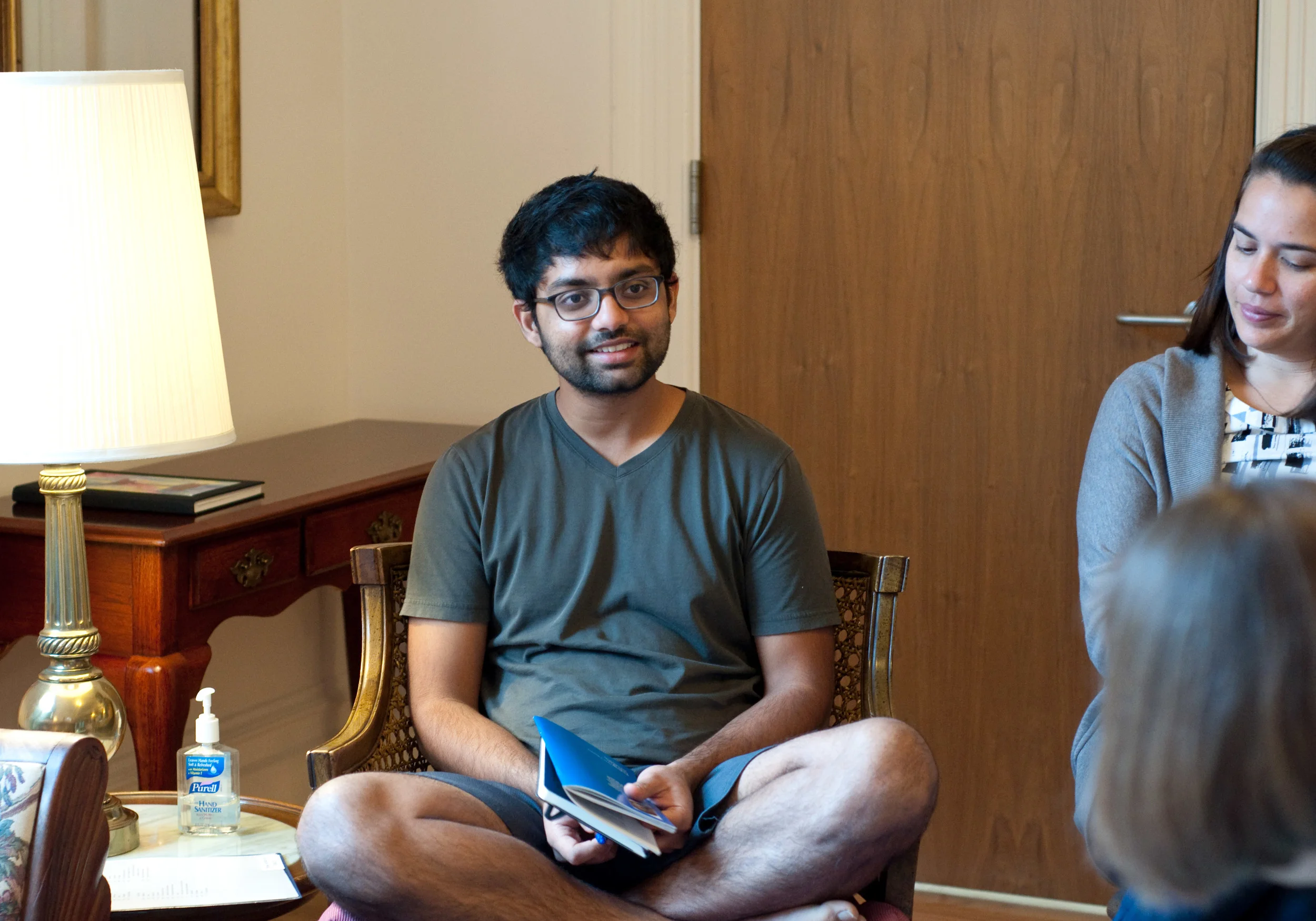Eknath Easwaran: A Light in the Darkness
/This week, we found a chapter entitled "A Light in the Darkness" from Easwaran's book Strength in the Storm, which captures the essence of how we can respond to tragedy, bringing about peace and hope in the midst of darkness.
For most people, I imagine, radio has lost its magic. But I remember vividly the awe I felt as a boy in my remote Indian village when I first heard, as if by magic, a box with knobs and dials pull out of the air a thin voice from thousands of miles away: “Good evening. This is the BBC...”
Today, of course, the air around us is awash with messages at different frequencies. Music, news, chatter, advertisements – we can tune to whatever we like.
It is very much the same with the mind. All of us know how sensitive we can be to feelings around us. We sense tension when we walk into a room, register the hostility in a meeting, vibrate with the emotions of a football crowd. And in times of crisis, when the very air seems full of fear and anger, everybody’s internal radio picks up the mood – and, all too often, passes it on.
This is a useful illustration, because it reminds us that the mind can be tuned. We do not have to accept the fear or anger around us; we can tune to a more positive channel. And when we do this, we are not the only ones who benefit. Just as everyone in a café relaxes when loud music is turned off, not tuning in to anger creates a zone of calm that helps those nearby calm down too.
This is easiest to see by negative example. You must have noticed how easily one person’s irritation is picked up by others. We bring it home and pass it around until everybody in the family falls asleep in it. Whenever we are discourteous, unkind, inconsiderate, selfish, we are broadcasting emotional states for others to pick up, even if we do not express our feelings in words or action. It’s not the passing event it seems. The signal has been sent, and like sound or light, it goes on spreading.
Similarly, when we are kind to somebody, a little force of kindness is released in the field of consciousness around us. If we go on being kind, the force becomes stronger. And when we do this every day, even to people who are unkind to us, the force becomes potent and reaches far. Even as you read this, such forces are at work within and around you. Kindness is working against unkindness, and the stronger it is, the farther it will reach.
This is crucial, for as Emerson says, “The ancestor of every action is a thought.” How we think shapes how we act, and the net effect of how each of us thinks and feels shapes the behavior of the groups we live in. The family is affected; co-workers are affected; eventually there is an effect on society itself.
And just as personal interactions shape the dynamics of a home or office or community, the sum total of all these interactions shapes the events of history. Markets are moved by the fear and greed of millions. Collective fear and helplessness can throw up a dictator. Anger multiplied a million times erupts in violence and triggers wars: leaders arise who are attuned to those emotions and express them in destructive action.
The mental states we tune to actually gain strength from the attention we give them. The more attention we give, the stronger they become. And just as people become addicted to drugs, the mind can become addicted to certain kinds of thinking. Fear is a drug; it can alter consciousness. So can greed. Anger is one of the most powerful of drugs, far more addictive than cocaine.
Nothing is more important for the modern world to understand. Any decision or action taken under the influence of fear, anger, or greed has to be disastrous. That is why most international policies are not successful: they are taken under the influence of fear, greed, and anger.
Fortunately, negative states of mind fade if they are not reinforced by repetition. However strong they appear, they come and go. What is positive in consciousness is permanent, unchanging. That is why I say that original goodness is part of our very nature. When we cease to feed negativity with our attention, what remains is positive. We can strengthen what is positive by removing negativity from our minds. That is what spiritual practices like the mantram can do.
The mind, then, is not only a receiver. It is also a repeater, passing on what it receives. Most of us have only a few watts to broadcast with, while someone like Gandhi could send his message around the world. But each of us is on the air. We broadcast what we are, and others pick it up. When Gandhi said “My life is my message,” he was speaking for us all.
Most of us do not like the idea of being a passive repeater for other people’s messages. We want to have a positive influence. Why do our lives seem to have so little effect?
The answer is that most of us have minds that are scattered or distracted: sometimes positive, sometimes negative, constantly changing with our shifting moods and desires. If we don’t seem to have much effect on the world we live in, it’s because the signals we broadcast are weak and confused. It is the concentrated, focused mind that reaches people. All the great changes in the world for good and for ill have come from the impact of men and women with an overriding singleness of purpose and a concentrated mind. In our own times, on the positive side, Gandhi is a perfect example.
Fortunately, none of us are stuck with the mind we’re born with. With practice, a distracted mind can be made one-pointed. By skills like repeating the mantram and learning to focus on one thing at a time, the mind can be made one-pointed on the essential goodness in every human heart. Then every negative emotion can gradually be transformed into a force for good. Anger, the most destructive of emotions – destructive of health, of peace of mind, of relationships, of life itself – can, when transformed, become a loving force that can change the world.
It has been said that anyone who wants a peaceful life has chosen the wrong time to be born. The last hundred years have seen incessant turbulence, change, and danger. Around the world, people are living with a deep anxiety about the future.
In such situations it is only natural to ask now and then, “Why was I born into times like these?” The answer I would give is that we have been born to be of help to others. Desperate times are a sign of a more desperate need. To make our full contribution, we need to train the mind to be at peace and then radiate that peace to those around us.
Very few of us really know what peace of mind is, the phrase has become so hackneyed. To think peace of mind comes by using chemical aids or moving to a quiet cabin on the seashore is to deny the very understanding of the word mind. In order to have peace of mind, thinking should be under control rather than at the mercy of fear and anger.
I was never a very angry person, but as a boy I was known for my fear. My cousins and classmates were brave, but I was not. I would never get into a fight, not out of noble motives but out of fear.
***
I took heart from the example of another fearful boy who had made himself fearless and showed all India how to throw off fear. By the time I went to college, Mahatma Gandhi had taken center stage in India, and he made his life an open book. Everyone in India knew that as a child he had been subject to all kinds of fears. Even as a young man, he confessed, he was afraid to go out at night without his wife.
And he was terrified of public speaking! Early in his law career he had to plead an open-and-shut case where all he had to say was, “Your honor, the accused owes my client fifty rupees and he won’t pay.” He stood up, opened his mouth, and couldn’t get out a word. Finally he had to hand the case over to a colleague and rush out of court humiliated.
That is the man who went to South Africa as a timid, untrained clerk and got drawn into selfless service. By the time he returned to India, twenty years later, all that fear had vanished. Against overwhelming odds and brutal opposition, he had led a completely nonviolent campaign against racial legislation in South Africa and won. In India, he could stand against the greatest empire the world had seen and say, “Do your worst. I will not retaliate, but I will never retreat.”
Today we would ask, “What kind of therapy did he undergo? What workshops did he attend?” But Gandhi never set out to make himself fearless. He simply began trying to serve those around him, spending less and less time on indulging himself and more on helping others. And the primary skill he used to support himself in these efforts was repetition of the mantram. Effort and the mantram together changed fear into fearlessness, anger into compassion, hatred into love.
That transformation is the reason I consider Gandhi a beacon for our times. “I have learnt through bitter experience,” he said, “the one supreme lesson to conserve my anger, and as heat conserved is transmuted into energy, even so our anger controlled can be transmuted into a power which can move the world.” And he added, “I have not the slightest doubt that any man or woman can achieve what I have, if he or she would make the same effort and cultivate the same hope and faith.” That is what the mantram can do.










